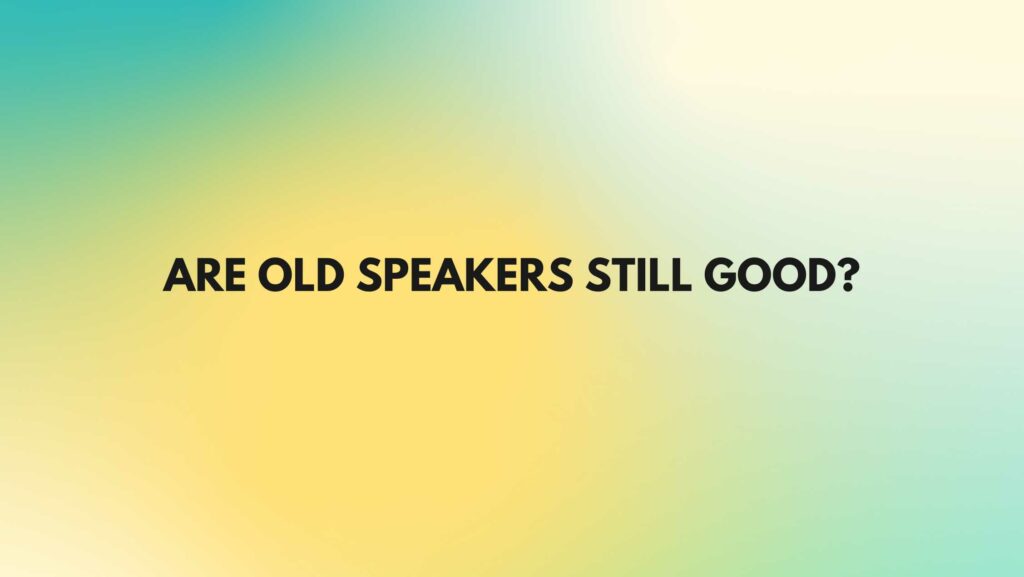In the ever-evolving world of audio technology, it’s easy to get swept up in the excitement of the latest and greatest speaker systems. With cutting-edge features, advanced materials, and sleek designs hitting the market regularly, it’s natural to assume that newer is always better. However, a passionate subset of audiophiles swears by vintage speakers, arguing that old speakers still possess a unique charm and quality that makes them worthwhile investments. In this article, we’ll delve into the question: Are old speakers still good?
The Evolution of Speaker Technology
To understand whether old speakers are still relevant today, it’s crucial to consider how speaker technology has evolved over the years. Speakers have come a long way since their inception in the late 19th century, progressing through various stages of development:
1. Electrodynamic Speakers (1920s): Early speakers were often large and bulky, with limited frequency response. They used electromagnetic principles to generate sound.
2. Full-Range Speakers (1940s-1950s): Mid-20th-century speakers saw improvements in frequency response, but they still lacked the precision and detail of modern counterparts.
3. Two-Way and Three-Way Systems (1960s-1970s): These designs separated drivers into dedicated units for better sound reproduction, introducing more clarity and accuracy.
4. The Advent of High-Fidelity (1970s-1980s): This era marked significant advancements in speaker design, materials, and crossover technology, leading to the production of some legendary vintage speakers.
5. Contemporary Speaker Technology (1990s-Present): Today’s speakers leverage advanced materials like neodymium magnets, improved driver designs, and digital signal processing for exceptional audio quality and versatility.
The Appeal of Vintage Speakers
Despite the impressive strides made in modern speaker technology, vintage speakers still hold a special place in the hearts of audiophiles and music enthusiasts. Here are some reasons why:
1. Unique Sound Characteristics: Vintage speakers often have a warm, analog sound that some listeners find more pleasing for certain genres of music. They may lack the clinical precision of modern speakers but offer a distinctive sonic character that appeals to many.
2. Build Quality: Many vintage speakers were built to last, featuring solid construction and high-quality materials. Some vintage models are considered classics for their durability and craftsmanship.
3. Nostalgia: Owning a piece of audio history can evoke feelings of nostalgia and a connection to a bygone era. Vintage speakers can bring back memories of a simpler time when music was experienced differently.
4. Collectibility: Some vintage speaker models have become collector’s items, with enthusiasts willing to pay a premium for well-preserved examples. This can make them not only great audio equipment but also valuable investments.
5. Customization Potential: Vintage speakers can be upgraded and modified by experienced hobbyists to improve their performance, making them adaptable to modern audio systems.
Considerations When Buying Vintage Speakers
Before rushing to buy vintage speakers, it’s essential to consider some key factors:
1. Condition: The condition of the speakers is crucial. Check for signs of wear, damage, or deterioration in the drivers, cabinets, and crossovers.
2. Compatibility: Ensure that the vintage speakers you’re considering are compatible with your existing audio setup, both in terms of connectivity and power requirements.
3. Maintenance: Vintage speakers may require maintenance or repairs due to their age. Factor in the cost and availability of replacement parts when making your decision.
4. Sound Preferences: Your personal taste in audio is essential. If you value precision and a clinical sound, vintage speakers might not be the best choice for you.
5. Budget: Vintage speakers can vary widely in price, from affordable models to high-end classics. Determine your budget and research accordingly.
Modern Alternatives
While vintage speakers have their charm and appeal, modern speakers offer a host of advantages, including cutting-edge technology, improved efficiency, and compatibility with modern audio sources. Moreover, many contemporary speakers aim to recreate the warm, vintage sound that some enthusiasts love, bridging the gap between old and new.
Conclusion
The question of whether old speakers are still good ultimately depends on your preferences and priorities as an audiophile or music enthusiast. Vintage speakers possess a unique character and charm that continues to captivate a dedicated following. However, they may not match the precision and convenience offered by modern speaker technology. Ultimately, the choice between old and new speakers should be guided by your appreciation for vintage aesthetics, sound characteristics, and your specific audio needs. Whether you opt for vintage or modern, the world of audio continues to provide an exciting and diverse array of options for music lovers to explore and enjoy.


